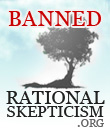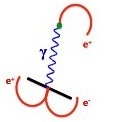A rational belief in the afterlife
Moderators: kiore, Blip, The_Metatron
Re: A rational belief in the afterlife
I recall one of the arguments put to me by a theist, who attempted to use a "Darwinian approach" to prove the veracity of Near-death experiences (NDEs) and out-of-body experiences (OBEs)...
* Near-death experiences tend to follow an established pattern, rather than being random.
* In evolution, the process of natural selection only preserves those traits that are advantageous to the species.
* Near-death hallucinations are not beneficial to the individual or to the species. Because such an hallucination would occur during the individual's expiry it would serve no "evolutionary purpose".
* Why (rhetorical question) would natural selection endow the brain with the capacity to experience a near-death hallucination if that hallucination served no purpose?
* Therefore the near-death experience is not an hallucination, it's an actual event that proves the existence of an afterlife.
I submitted this line of reasoning in a post at the RichardDawkins forum (must've been about three or four years ago). In a series of very elegant responses, it was pointed out that the natural selection "argument" is just a red herring... one that proceeds from the erroneous assumption that evolution somehow possesses intent.
The NDE / out-of-body-experience has been replicated numerous times over... with electrical stimulation to the brain, with conditions of hypoxia (oxygen deprivation), and with dissociative drugs (e.g. ketamine).
In short, there's no evidence to suggest that the NDE/OBE is anything more than an hallucination.
* Near-death experiences tend to follow an established pattern, rather than being random.
* In evolution, the process of natural selection only preserves those traits that are advantageous to the species.
* Near-death hallucinations are not beneficial to the individual or to the species. Because such an hallucination would occur during the individual's expiry it would serve no "evolutionary purpose".
* Why (rhetorical question) would natural selection endow the brain with the capacity to experience a near-death hallucination if that hallucination served no purpose?
* Therefore the near-death experience is not an hallucination, it's an actual event that proves the existence of an afterlife.
I submitted this line of reasoning in a post at the RichardDawkins forum (must've been about three or four years ago). In a series of very elegant responses, it was pointed out that the natural selection "argument" is just a red herring... one that proceeds from the erroneous assumption that evolution somehow possesses intent.
The NDE / out-of-body-experience has been replicated numerous times over... with electrical stimulation to the brain, with conditions of hypoxia (oxygen deprivation), and with dissociative drugs (e.g. ketamine).
In short, there's no evidence to suggest that the NDE/OBE is anything more than an hallucination.
-

Mike_L - Banned User
- Posts: 14455

- Country: South Africa
Re: A rational belief in the afterlife
DrParisetti wrote:... 3. At this stage, I am frankly not interested in the philosophical aspects (why survival, what kind of survival) or the admittedly resounding lack of a theory to explain the mechanics of it all. I am immensely intrigued by the data. As a rational person, I follow the data and choose the least incredible explanation consistent with them: in some ways we don't understand, human personality appears to survive the death of the physical body.
The point is, when an apple falls to earth, we have an objective event, that anyone can witness. We have data, we can hypothesise, experiment, theorise. The theory explains/accounts for the observable data.
Here is something of the problem I see with what you're propounding here. There are events that are not easily explicable. Most are accounts, but I'm not about to dismiss those as data. They constitute evidence for someone having had an experience, or at least claiming that they did. Potentially unreliable data, certainly lacking the objectivity of a falling apple, but we're dealing with a different sort of phenomena here.
Now, the next step should be to think very hard about the claims made. They may be claimed to be out of body experiences, but a claim of OOB experience doesn't make it an OOB. We must consider all other explanations. We should test for them, and whilst constructing an experiment where your subject is going to die might be fraught with ethical difficulties, not to mention the practical ones (being assured of reviving them for instance), we should be able to reduce the variables to some degree. But that inability to actually experiment, reduces the quality of data we have to work with. We are invariably left with a self-report, and maybe some peripheral data from medical equipment. One thing we don't have access to is brain chemistry, and another is direct access to a subject's consciousness.
One set of data that I've rarely seen explained, is those who to all intents & purposes, die, yet report none of the experiences that some others do.
Moving on, the issue of theory. If you are intrigued by the accounts (and I am too), it's not too much to expect that you might have considered likely explanations, not just the surviving death one. But the surviving death explanation seems to be the point of interest here, moreso than the phenomena of NDEs. You claim that it's because this explanation best accounts for the data, which is what a theory does. So what is your theory? You must have considered a mechanism for the various factors involved (spirit/soul, why it takes on corporeal form, how long it persists after death, whether it exists before birth, what it does, where it goes, how it is sustained etc). Let's hear your theories. Let's see whether they are falsifiable, replicable, simply investigatable!
And, one last thing for now, you mention personality seeming to survive death. Some people's personality doesn't even survive life. As a psychologist, I regularly find myself working with people with brain injury and degenerative brain conditions, including the various dementias. It's an area of neuroscience that I find fascinating. What I'm now wondering is this - when these people die, is the personality that survives the same as the one that has just died? And if so, where did the previous personality go? Further, what sort of personality persists when an incompletely developed personailty dies (infant deaths for example)?
“There is a rumour going around that I have found God. I think this is unlikely because I have enough difficulty finding my keys, and there is empirical evidence that they exist.” Terry Pratchett
-

chairman bill - RS Donator
- Posts: 28354

- Country: UK: fucked since 2010

Re: A rational belief in the afterlife
Paula wrote:twistor59 wrote:DrParisetti wrote:
Well, I understand that when there is no detectable electrical activity in the brain, a person is considered clinically dead. I also understand that (although this is debatable) no detectable electrical activity may not mean that the brain has shut down completely, and there may be some residual neuronal activity in the brain stem. Do we agree that, dead or not dead, such a status is incompatible with a) the production of consciousness or elements thereof and, especially, b) the onset of a highly structured conscious experience and c) the production of detailed memories which are perfectly conserved?
I think the only person who could give an educated opinion on that which I would consider worthwhile would be a neuroscientist. Not some random dudes on the internet. Sorry Ratskeppers.
Aw, I was going to give it a stab, never mind
A soul in tension that's learning to fly
Condition grounded but determined to try
Can't keep my eyes from the circling skies
Tongue-tied and twisted just an earthbound misfit, I
Condition grounded but determined to try
Can't keep my eyes from the circling skies
Tongue-tied and twisted just an earthbound misfit, I
-

twistor59 - RS Donator
- Posts: 4966


Re: A rational belief in the afterlife
twistor59 wrote:Paula wrote:twistor59 wrote:DrParisetti wrote:
Well, I understand that when there is no detectable electrical activity in the brain, a person is considered clinically dead. I also understand that (although this is debatable) no detectable electrical activity may not mean that the brain has shut down completely, and there may be some residual neuronal activity in the brain stem. Do we agree that, dead or not dead, such a status is incompatible with a) the production of consciousness or elements thereof and, especially, b) the onset of a highly structured conscious experience and c) the production of detailed memories which are perfectly conserved?
I think the only person who could give an educated opinion on that which I would consider worthwhile would be a neuroscientist. Not some random dudes on the internet. Sorry Ratskeppers.
Aw, I was going to give it a stab, never mind
No offence - I include myself in this category too.
Absolutely no offence taken, I mean really, none
-

Scarlett - Posts: 16046

Re: A rational belief in the afterlife
Mike_L wrote:I recall one of the arguments put to me by a theist, who attempted to use a "Darwinian approach" to prove the veracity of Near-death experiences (NDEs) and out-of-body experiences (OBEs)...
* Near-death experiences tend to follow an established pattern, rather than being random.
* In evolution, the process of natural selection only preserves those traits that are advantageous to the species.
* Near-death hallucinations are not beneficial to the individual or to the species. Because such an hallucination would occur during the individual's expiry it would serve no "evolutionary purpose".
* Why (rhetorical question) would natural selection endow the brain with the capacity to experience a near-death hallucination if that hallucination served no purpose?
* Therefore the near-death experience is not an hallucination, it's an actual event that proves the existence of an afterlife.
I submitted this line of reasoning in a post at the RichardDawkins forum (must've been about three or four years ago). In a series of very elegant responses, it was pointed out that the natural selection "argument" is just a red herring... one that proceeds from the erroneous assumption that evolution somehow possesses intent.
Notice, there's another hidden assumption here: that the hallucinations (if they are such) aren't resulting from misfiring and mistakes of complex functionality that does usually confer an advantage in the Darwinian sense (when working properly). Obviously something not working properly confers no advantage, but every organism eventually faces the prospect of failing organs and systems.
"Change will preserve us. It is the lifeblood of the Isles. It will move mountains! It will mount movements!" - Sheogorath
-

Matthew Shute - Name: Matthew Shute
- Posts: 3676
- Age: 45

Re: A rational belief in the afterlife
Not a neuroscientist, but I can offer this - some evidence that electrocerebral silence is not always evidence of brain death - can be confounded.
http://pediatrics.aappublications.org/content/128/3/e720.long
Appendix 4 summarizes EEG data from 12 studies in 485 suspected brain dead children in all age groups.34,54,–,65 The data show that 76% of all children who were evaluated with EEG for brain death on the first EEG had ECS. Multiple EEGs increased the yield to 89%. For those children who had ECS on their first EEG, 64/66 patients (97%) had ECS on a follow-up EEG. The first exception was a neonate who had a phenobarbital level of 30 μg/mL when the first EEG was performed.65 The second exception was a 5 year old head trauma patient who was receiving pentobarbital and pancuronium at the time of the initial EEG.62 This patient also had a CBF study performed demonstrating flow. In retrospect, these two patients would not have met currently accepted standards for brain death based on pharmacologic interference with EEG testing.
http://pediatrics.aappublications.org/content/128/3/e720.long
Appendix 4 summarizes EEG data from 12 studies in 485 suspected brain dead children in all age groups.34,54,–,65 The data show that 76% of all children who were evaluated with EEG for brain death on the first EEG had ECS. Multiple EEGs increased the yield to 89%. For those children who had ECS on their first EEG, 64/66 patients (97%) had ECS on a follow-up EEG. The first exception was a neonate who had a phenobarbital level of 30 μg/mL when the first EEG was performed.65 The second exception was a 5 year old head trauma patient who was receiving pentobarbital and pancuronium at the time of the initial EEG.62 This patient also had a CBF study performed demonstrating flow. In retrospect, these two patients would not have met currently accepted standards for brain death based on pharmacologic interference with EEG testing.
- Pebble
- Posts: 2812
- Country: UK

Re: A rational belief in the afterlife
DrParisetti wrote:OK, thanks everybody for the many responses. Being very green at this, I realise that this must be a full-time job... I am also reminded that that I am quite hurt when confronted with what I consider unnecessary verbal aggression. My problem, not anybody else.
Let's perhaps try to limit the vast area of discussion, at least by now, by focussing on one area. I see, for example, that there is sympathy here for the the idea that NDEs are accounted for by the fact that the person is not really dead.
Well, I understand that when there is no detectable electrical activity in the brain, a person is considered clinically dead. I also understand that (although this is debatable) no detectable electrical activity may not mean that the brain has shut down completely, and there may be some residual neuronal activity in the brain stem. Do we agree that, dead or not dead, such a status is incompatible with a) the production of consciousness or elements thereof and, especially, b) the onset of a highly structured conscious experience and c) the production of detailed memories which are perfectly conserved?
How do we account for the fact that a, b and c are consistently reported in the absence of detectable electrical activity from the brain? No proof of afterlife, here, just narrowing the discussion a lot and moving on form there.
Your question assumes that a, b, and c resulted from the period during which there was no detectable brain activity. You need to substantiate that claim before discussing the question.
There is also a rather obvious but, nonetheless, easily overlooked problem with this claim: If the brain was not working during the time the event occurred, how could it be remembered?
"A community is infinitely more brutalised by the habitual employment of punishment than it is by the occasional occurrence of crime." -Oscar Wilde
-

Shrunk - Posts: 26170
- Age: 59

- Country: Canada

Re: A rational belief in the afterlife
Just popping a marker in.
She battled through in every kind of tribulation,
She revelled in adventure and imagination.
She never listened to no hater, liar,
Breaking boundaries and chasing fire.
Oh, my my! Oh my, she flies!
She revelled in adventure and imagination.
She never listened to no hater, liar,
Breaking boundaries and chasing fire.
Oh, my my! Oh my, she flies!
-

Fallible - RS Donator
- Name: Alice Pooper
- Posts: 51607
- Age: 51

- Country: Engerland na na

Re: A rational belief in the afterlife
DrParisetti wrote:OK, thanks everybody for the many responses. Being very green at this, I realise that this must be a full-time job... I am also reminded that that I am quite hurt when confronted with what I consider unnecessary verbal aggression. My problem, not anybody else.
Don't worry about Hack, he is the other sweary one after all. None the less, it's important for you to cite the evidence that you mean to discuss first hand. Don't point us at your book, show us the evidence that convinces you. Copy and paste if you must.
Well, I understand that when there is no detectable electrical activity in the brain, a person is considered clinically dead.
That is incorrect. Clinical death regards only cardiopulmonary cessation, not brain death.
I also understand that (although this is debatable) no detectable electrical activity may not mean that the brain has shut down completely, and there may be some residual neuronal activity in the brain stem. Do we agree that, dead or not dead, such a status is incompatible with a) the production of consciousness or elements thereof and, especially, b) the onset of a highly structured conscious experience and c) the production of detailed memories which are perfectly conserved?
As you have cited already. Our ability to detect brain function does not walk in lock step with the presence of brain function. For the sake of the discussion I would agree that if we could demonstrate that there is absolutely no electrical activity then conscious experience is impossble.
How do we account for the fact that a, b and c are consistently reported in the absence of detectable electrical activity from the brain? No proof of afterlife, here, just narrowing the discussion a lot and moving on form there.
I'm interested to hear of a report from a patient that specifically had a near death experience while they were dead.
I'm pleased to see that we're getting into the nuts and bolts of the discussion. Now I have a question for you:
How can we be sure that the personal experiences described in your book are the product of being close to death and not a product of the physiological condition that a subject is in at the time? How can we discern between the two?
Secondly, if we can demonstrate that these are physiological experiences as opposed to ND experiences. Would you accept that the physiological experience is the more parsimonious?
Last edited by Bribase on Sep 12, 2012 8:57 pm, edited 2 times in total.
-

Bribase - Posts: 2671
- Age: 42

Re: A rational belief in the afterlife
Great questions, Bribase.
I disagree with the earlier statement that discussing these claims require expertise in neuroscience. From my reading (admittedly much less than 30 000 papers' worth) the weaknesses in the claims of NDE's as evidence of an afterlife result more from simple logical errors and unexamined assumptions, such as the ones you bring up.
I disagree with the earlier statement that discussing these claims require expertise in neuroscience. From my reading (admittedly much less than 30 000 papers' worth) the weaknesses in the claims of NDE's as evidence of an afterlife result more from simple logical errors and unexamined assumptions, such as the ones you bring up.
"A community is infinitely more brutalised by the habitual employment of punishment than it is by the occasional occurrence of crime." -Oscar Wilde
-

Shrunk - Posts: 26170
- Age: 59

- Country: Canada

Re: A rational belief in the afterlife
DrParisetti wrote:OK, thanks everybody for the many responses. Being very green at this, I realise that this must be a full-time job... I am also reminded that that I am quite hurt when confronted with what I consider unnecessary verbal aggression. My problem, not anybody else.
Let's perhaps try to limit the vast area of discussion, at least by now, by focussing on one area. I see, for example, that there is sympathy here for the the idea that NDEs are accounted for by the fact that the person is not really dead.
Well, I understand that when there is no detectable electrical activity in the brain, a person is considered clinically dead.
No, clinically dead is when the heart stops pumping blood. The brain can go on functioning for a bit. Why do I need to tell a doctor this?
There is nothing so absurd that some philosopher will not say it - Cicero.
Traditionally these are questions for philosophy, but philosophy is dead - Stephen Hawking
Traditionally these are questions for philosophy, but philosophy is dead - Stephen Hawking
-

Oldskeptic - Posts: 7395
- Age: 67

Re: A rational belief in the afterlife
Oldskeptic wrote:DrParisetti wrote:OK, thanks everybody for the many responses. Being very green at this, I realise that this must be a full-time job... I am also reminded that that I am quite hurt when confronted with what I consider unnecessary verbal aggression. My problem, not anybody else.
Let's perhaps try to limit the vast area of discussion, at least by now, by focussing on one area. I see, for example, that there is sympathy here for the the idea that NDEs are accounted for by the fact that the person is not really dead.
Well, I understand that when there is no detectable electrical activity in the brain, a person is considered clinically dead.
No, clinically dead is when the heart stops pumping blood. The brain can go on functioning for a bit. Why do I need to tell a doctor this?
Dr Parisetti wrote:All right – I am a medical doctor, with postgraduate education in public
health and disaster management. I have spent some fifteen years working
in the management of large-scale international humanitarian operations,
serving in various capacities for the International Red Cross and for the
United Nations. A few years ago I left my active, operational engagement
in this sector to start a late academic career: I am currently Professor of
Emergencies and Humanitarian Action at the Institute for International
Political Studies of Bocconi University in Milan, Italy, and a visiting
professor at the universities of York (UK), Pisa (Italy) and Geneva
(Switzerland, where I live). I am also the author of several books, articles
and technical publications in my area of expertise.
Hmmm.
Why do you think that?
- GrahamH
- Posts: 20419
Re: A rational belief in the afterlife
Sorry, Twistor, who exactly is some random dude on the internet? me? well, possibly, but I am sure that most of the readership of this forum is well acquainted with the basic tenants of contemporary neurophysiology. It does not take a PhD to understand the fashionable equation mind=brain, and therefore no brain = no mind.
can we please go past this point and express some opinions? thanks
can we please go past this point and express some opinions? thanks
______________________________________________
vice
vice
-

DrParisetti - Banned User
- THREAD STARTER
- Name: Piero Calvi-Parisetti
- Posts: 19
- Age: 63

- Country: UK
Re: A rational belief in the afterlife
DrParisetti wrote:Sorry, Twistor, who exactly is some random dude on the internet? me? well, possibly, but I am sure that most of the readership of this forum is well acquainted with the basic tenants of contemporary neurophysiology. It does not take a PhD to understand the fashionable equation mind=brain, and therefore no brain = no mind.
can we please go past this point and express some opinions? thanks
Can you provide some evidence of NDEs in people diagnosed brain dead? Just to get us started.
Why do you think that?
- GrahamH
- Posts: 20419
Re: A rational belief in the afterlife
And, sorry, oldskeptic, I am afraid you are confusing things. According to forensic medicine, clinical death is pronounced when the EEG is flat, which happens literally within a few seconds from when the hart stops pumping, and indicates absence of electrical activity.
Let me insist. Dead or not dead, how do we account for a) any consciousness at all, b) highly structured conscious experiences and c) the formation of long-term memories, when simply there is no brain.
I repeat. No "proof" whatsoever, just to get the discussion going. Thanks.
Let me insist. Dead or not dead, how do we account for a) any consciousness at all, b) highly structured conscious experiences and c) the formation of long-term memories, when simply there is no brain.
I repeat. No "proof" whatsoever, just to get the discussion going. Thanks.
______________________________________________
vice
vice
-

DrParisetti - Banned User
- THREAD STARTER
- Name: Piero Calvi-Parisetti
- Posts: 19
- Age: 63

- Country: UK
Re: A rational belief in the afterlife
DrParisetti wrote:Sorry, Twistor, who exactly is some random dude on the internet? me? well, possibly, but I am sure that most of the readership of this forum is well acquainted with the basic tenants of contemporary neurophysiology. It does not take a PhD to understand the fashionable equation mind=brain, and therefore no brain = no mind.
can we please go past this point and express some opinions? thanks
OK.
Lets assume that the 'mind' survives death.
Where does this surviving mind reside and how does it process information?
Scarlett and Ironclad wrote:Campermon,...a middle aged, middle class, Guardian reading, dad of four, knackered hippy, woolly jumper wearing wino and science teacher.
-

campermon - RS Donator
- Posts: 17444
- Age: 54


Re: A rational belief in the afterlife
Is this going to be nothing but anecdotes?
Why do you think that?
- GrahamH
- Posts: 20419
Re: A rational belief in the afterlife
Maybe you could focus on this part of a previous post of mine ...
... one last thing for now, you mention personality seeming to survive death. Some people's personality doesn't even survive life. As a psychologist, I regularly find myself working with people with brain injury and degenerative brain conditions, including the various dementias. It's an area of neuroscience that I find fascinating. What I'm now wondering is this - when these people die, is the personality that survives the same as the one that has just died? And if so, where did the previous personality go? Further, what sort of personality persists when an incompletely developed personailty dies (infant deaths for example)?
“There is a rumour going around that I have found God. I think this is unlikely because I have enough difficulty finding my keys, and there is empirical evidence that they exist.” Terry Pratchett
-

chairman bill - RS Donator
- Posts: 28354

- Country: UK: fucked since 2010

Re: A rational belief in the afterlife
This is not a particularly rational forum Dr. Parsetti. It is just another atheist forum. It is the offshoot of the old Dawkins forum. You will find radical skepticism, dismissal, misrepresentation, and (passive) aggression, and not much else (that is if you offer anything besides a materialistic account of anything). To be sure, and to be clear, there are exceptions to the rule, but it is the rule.
I just thought I would forewarn you; it's just my opinion, maybe you will have a different experience. I look forward to reading what you have to say, and asking questions where I can. I have done a good amount of NDE research (on the Internet, that is) and am very interested in the subject.
Welcome to ratskep, and cheers.
I just thought I would forewarn you; it's just my opinion, maybe you will have a different experience. I look forward to reading what you have to say, and asking questions where I can. I have done a good amount of NDE research (on the Internet, that is) and am very interested in the subject.
Welcome to ratskep, and cheers.
Bring me gold and bring me wisdom- give me scars to bring me grace.
A wicked wit and when I use it I dash the hopes of those who hate me.
Give me love- big as a mountain.
Dave Matthews
A wicked wit and when I use it I dash the hopes of those who hate me.
Give me love- big as a mountain.
Dave Matthews
- amkerman
- Posts: 1820
- Age: 39

- Country: United States

Re: A rational belief in the afterlife
Dear GrabamH, when I spoke about the complexity of the issue I was accused of being patronising...
You ask for "some evidence". The The Handbook of Near-Death Experiences: Thirty Years of Investigation (Holden, Greyson, James, eds) lists 65 papers published in peer-reviewed journals, covering a total of 3,500 cases in four continents. More, key research has been produced in the 6 years after the Handbook was published.
What do I do?
You ask for "some evidence". The The Handbook of Near-Death Experiences: Thirty Years of Investigation (Holden, Greyson, James, eds) lists 65 papers published in peer-reviewed journals, covering a total of 3,500 cases in four continents. More, key research has been produced in the 6 years after the Handbook was published.
What do I do?
______________________________________________
vice
vice
-

DrParisetti - Banned User
- THREAD STARTER
- Name: Piero Calvi-Parisetti
- Posts: 19
- Age: 63

- Country: UK
Who is online
Users viewing this topic: No registered users and 1 guest